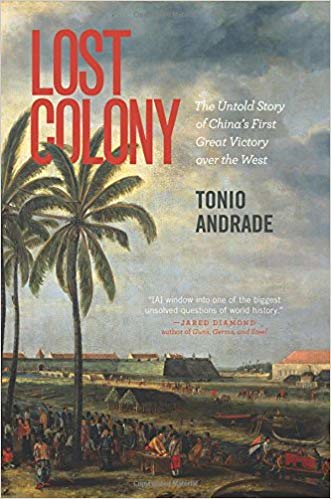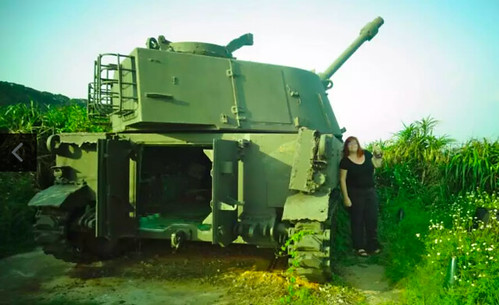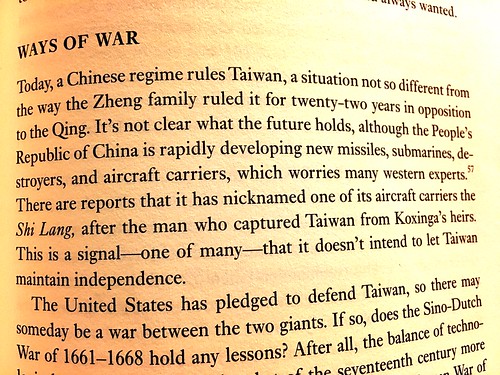 |
| Come for the nudity. Stay for the underpants. |
Drunken German traitors. Bum-waving Swiss farmers releasing streams of foul expletives. A missionary in dirty underpants. Naked swimmers, a Chinese general who (probably) had syphilis, slaps, mad rages, racist colonial caricatures getting all up in each others' grills, a two-timing translator/con-man, fire ships and booby traps (no actual boobies it seems, though). A war whose outcome may have been decided on the relative discipline and adaptability of each side's leaders, or on what technology and food supplies they had...or maybe it was just the weather.
These are the colorful details that illustrate Tonio Andrade's meticulous historical account of the defeat of the Dutch colony in Formosa by another kind of colonizer - Zheng Chenggong (Koxinga). Well, sort of - calling it "a meticulous historical account" is actually doing Lost Colony a disservice, although it could easily pass muster as an assigned text in an academic setting. It's also a rollicking good read.
Don't let that lull you into a belief that it's a light read, though. The book explores some heavy themes, ultimately challenging the old and, to be frank, kind of racist assertion that Western colonial powers won wars because they were more disciplined or had a technological or perhaps tactical edge. (Andrade doesn't call it racist; I'm calling it racist.) The central question is worth asking: if Western powers really had all of these advantages, and that's why they conquered so much of the world, how is it that they lost Taiwan?
Through the story, Andrade discusses and compares the relative merits of Dutch and Chinese warships, military technology (including artillery, weaponry and fortifications) and military strategy. He discusses the evolution of those ships, too, based on weather conditions sailing in the Atlantic and around Africa as opposed to Asia, with its monsoons. Don't think this means that Lost Colony is a boring military history though. It's got military elements - it kind of has to - but they don't slow down the story. Hell, I loved this book, and I'm just not that into military history.
This isn't because I'm a girl who doesn't like Big Manly Weapons because they're So Big and Manly, by the way. I grew up around guns and books on military history and have a healthy respect for firepower used intelligently.
Naw, it's because I'd rather we didn't need militaries at all. Too bad we don't live in that world. Anyway.
 |
| I like...big...guns and I cannot lie (me & a howitzer from our trip to the Matsu islands) |
It's no wonder that writer Joyce Bergvelt chose to novelize it in Lord of Formosa (although Lost Colony was not available to her as a source when she did). I called that fictionalized account "cinematic in scope", and frankly, for a work of non-fiction, so is Lost Colony. Count me among those who say that this story should be made into a film as a way of exporting Taiwanese soft power abroad.
That's all well and good, you're saying, and I love a good story about conniving translator-businessmen and foul-mouthed bum-slappers, but how is historical account about something that happened in the 1600s relevant to my life?
Well, it's a well-worn adage among those who know Taiwan that the coming-to-Taiwan stories of Koxinga and Chiang Kai-shek share many parallels, which invites consideration of the present day seeing as the Republic of China has still unfortunately not given way to the Republic of Taiwan. I'm not going to talk about that, though, because everyone does. I'm more interested in how Andrade's telling of what happened when the military apparatus of a Western country met an Eastern one, and what that has to tell us about Taiwan's biggest foe.
The Art of War figures heavily in the narrative as well - and in fact, when hearing about the various axioms Koxinga was known to employ in practice, I could not help but think of the current tactics of the Chinese Communist Party in trying to convince the West that it is not an ideological foe - when it absolutely is - and bring Taiwan to heel.
By the time I got to the end, Andrade seemed to agree with me:
 |
| "Today, a Chinese regime rules Taiwan"...I think I officially have an intellectual crush on Tonio Andrade. Freddy's still my guy in the end, though. |
After all, as Andrade notes, just because we think the West as a military advantage over China in terms of both technology and numbers - the US spends several times more on its military than China does - that doesn't necessarily mean we will win a potential future war. Frederick Coyet (the last colonial governor of Dutch Formosa who lost the war with Koxinga) had plenty of advantages - Renaissance fort architecture, big ships carrying heavy artillery that could sail at a closer tack against the wind than Chinese war junks, a potential alliance with Koxinga's enemy, the nascent Qing dynasty, and advice from Chinese defectors. For several potential reasons explored in the book, including a false belief in the superior discipline of his troops and his failure to listen and adapt, he lost anyway. We might too, and it's more than just Taiwan at stake.
Lost Colony tells its story with a remarkably clear-eyed look on the past. In much of Taiwan and parts of China, when Koxinga's conquest of Taiwan is discussed, there's an undertow of a sort of ethnic pride that one of their own (I suppose) kicked out the red-haired foreign colonizers.
The Dutch are no longer hated in Taiwan, per se - their colonial rule was so short-lived, involved such a small slice of Taiwan, and happened so long ago that it would be odd if they were - but Koxinga is seen by many as a hero. To be frank, it's a way of thinking I also find common to the Western left: of course someone like Koxinga would be the "good guy", relatively speaking. He was Chinese, Taiwan is Chinese (it's in Asia, anyway - same diff to a lot of Westerners), and Western imperialists were, and are, evil.
Western imperialism was and is evil, of course. Imperialism sucks. But this doesn't make Koxinga a comparatively "good guy" or a "hero". He was a warlord too - a colorful, brilliant warlord, to be sure - but still a conquering colonizer. The Chinese in Taiwan at the time were immigrants, not native inhabitants, and Taiwan subsequently became a settler state. Of course, your average Westerner probably has no idea who Koxinga was, but the big-picture implications of this kind of thinking are troublesome. Andrade understands this, I wish more Westerners (and Asians) did, too. He tells the story without picking sides. He made a case that we shouldn't dismiss the history of Asian military technology, training and strategy, while pointing out objectively who seemed to have advantages in what areas.
Andrade ends on an ominous note: the seventeenth century, when all of this took place, was one of the most tumultuous in human history, in part because of a spate of climate change that started wars, decimated populations and caused governments to be overthrown.
The climate change facing us in the twenty-first century, he notes, is likely to be several orders of magnitude worse than that. How will we face it?
Don't let all that doom-and-gloom scare you off, though.
There's also the aforementioned cursing Swiss bum-shakers, drunkenness, nudity, a fair number of references to testicles (one person got a cannon-ball shot straight through his) and a missionary in dirty underpants. There was a surprisingly detailed account of exactly how and when the Dutch, holed up in Fort Zeelandia, could go to the bathroom, and how often body parts got blown off by enemy fire in the process.
Read it because it's serious, but also read it because it's fun.
